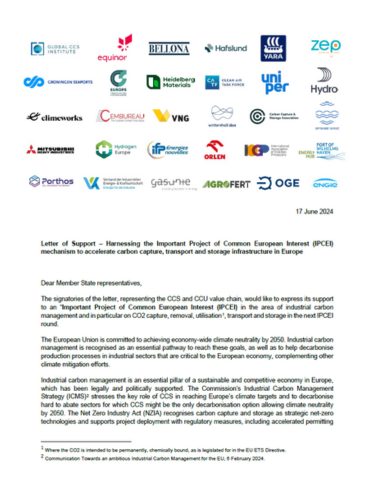Open letter: Harnessing the IPCEI mechanism to boost CCS and CCU
30 members of the industrial carbon management community and several umbrella organisations have come together to emphasise the importance of supporting an IPCEI (Important Project of Common European Interest) dedicated to industrial carbon management (ICM). This encompasses CO2 capture, removal, utilisation, transport, and storage infrastructure. This broad coalition, involving companies across the value chain, as well as environmental NGOs, call on Member States’ representatives of the Joint Forum for IPCEI (JEF-IPCEI) to prioritize ICM in the upcoming technical meeting and to increase the JEF-IPCEI effectiveness to allow for the rapid decarbonisation of hard-to-abate sectors.
CCS plays a critical role in achieving Europe’s climate neutrality, as underscored by the European Commission communications on the Industrial Carbon Management Strategy and the 2040 Climate Target. The recently adopted NZIA recognizes CCS as strategic net-zero technologies, enabling faster permitting and introducing an annual CO2 storage objective of 50 million tonnes.
However, challenges such as lack of viable business cases, including funding and de-risking mechanisms, hinder the deployment of CCS across Europe. Ensuring access to CO2 transport and storage infrastructure can enhance Europe’s industrial competitiveness and the integrity of the internal market. To this end, the Commission has declared that it would support an IPCEI for industrial carbon management, in its recent Industrial Carbon Management Strategy. It is now for EU Member States to initiate this process.
What are Important Projects of Common European Interest (IPCEI)?
IPCEI brings together the public and private sectors to undertake large-scale projects, addressing market failure and societal challenges. Selected IPCEIs significantly contribute to EU objectives and must benefit the EU economy and society as a whole. Eligible IPCEIs must demonstrably overcome market failures, involve at least four Member States, offer genuine participation opportunities to all Member States, secure significant co-financing, and respect the “do-no-harm” principle.
Member States initiate and fund IPCEIs to address market failure requiring significant public intervention, whenever projects would not be financed by the market alone. The European Commission ensures eligibility and approves proposed IPCEIs. Since 2023, the JEF-IPCEI, comprising Member States, Commission representatives, industry, and academia experts, aims to enhance IPCEI effectiveness and identify strategic technologies for potential future IPCEIs.
